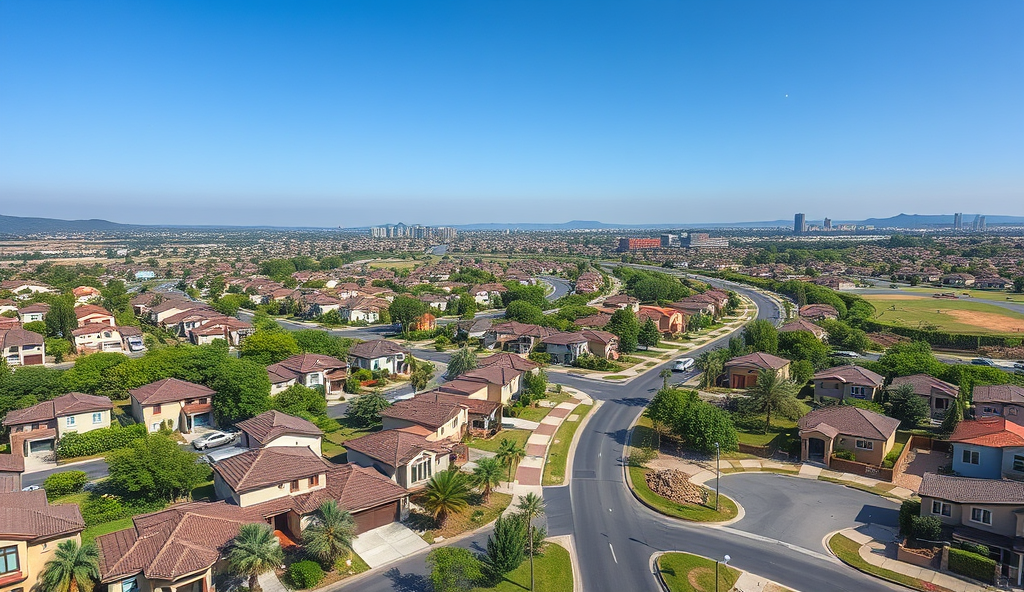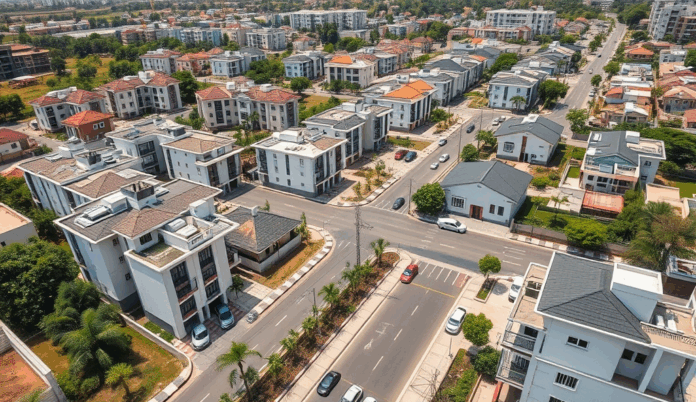Introduction to the Jabi Housing Market in Nigeria
The Jabi housing market has emerged as a prime investment destination in Abuja, offering a blend of affordability and strategic location advantages. Recent data from PropertyPro.ng (2023) shows a 12% year-on-year increase in property demand, driven by Jabi’s proximity to business districts and growing middle-class population.
Investors are particularly drawn to the area’s mix of residential and commercial developments, with average property prices ranging from ₦40 million to ₦120 million depending on unit size and amenities. The rental market remains robust, with 3-bedroom apartments fetching between ₦1.5 million to ₦3 million annually, according to Q2 2023 market reports.
This growth trajectory positions Jabi as a key focus for real estate investors seeking stable returns in Nigeria’s capital. The following section will explore Jabi’s location dynamics and demographic profile to provide deeper market context.
Key Statistics

Overview of Jabi’s Location and Demographics
The Jabi housing market has emerged as a prime investment destination in Abuja offering a blend of affordability and strategic location advantages.
Strategically positioned in Abuja’s Central Business District, Jabi offers unmatched accessibility to key government offices, corporate hubs, and the Nnamdi Azikiwe International Airport, making it a magnet for professionals and investors alike. The 2023 Abuja Geographic Information Systems (AGIS) report shows Jabi’s population grew by 18% since 2020, now exceeding 120,000 residents with a median age of 32.
This youthful demographic primarily consists of middle-class professionals working in nearby business districts, creating consistent demand for quality housing. Recent surveys indicate 68% of Jabi residents are employed in banking, tech, or government sectors, with average household incomes ranging between ₦500,000 to ₦1.2 million monthly.
The area’s balanced mix of residential estates and commercial developments has fostered a vibrant community atmosphere while maintaining investment appeal. These location advantages and demographic trends directly influence the property market dynamics we’ll examine next.
Current Property Prices and Trends in Jabi
Jabi's property market reflects its growing appeal with average apartment prices rising 22% year-on-year to ₦45 million as of Q1 2024.
Jabi’s property market reflects its growing appeal, with average apartment prices rising 22% year-on-year to ₦45 million as of Q1 2024, according to PropertyPro.ng data. This surge aligns with the area’s demographic shift, as young professionals increasingly seek modern housing near their workplaces in Abuja’s business districts.
Rental yields remain strong at 6-8% annually, outperforming many Abuja suburbs, driven by high demand from banking and tech employees. The most sought-after properties are 3-bedroom apartments near Jabi Lake Mall, commanding rents between ₦1.8-₦2.5 million annually.
Developers are responding to market trends with mixed-use projects combining residential and retail spaces, particularly along Usuma Street. These dynamics set the stage for examining the diverse property types available in Jabi next.
Types of Properties Available in Jabi
Jabi's housing market shows a 15% year-on-year demand surge for mid-range apartments driven by young professionals relocating from high-cost areas like Maitama.
Jabi’s property market caters primarily to young professionals, with modern 2- and 3-bedroom apartments dominating 65% of listings, per Q1 2024 data from PropertyPro.ng. The most premium offerings are duplexes near Jabi Lake Mall, priced between ₦80-₦120 million, attracting senior executives from nearby corporate hubs.
Developers are increasingly launching mixed-use complexes along Usuma Street, blending retail spaces with luxury condos that average ₦60 million per unit. These projects account for 30% of new supply in 2024, responding to demand for integrated living solutions among tech and banking professionals.
Serviced apartments and studio units have also gained traction, particularly among single professionals, with rents ranging ₦900,000-₦1.2 million annually. This diversity in Jabi’s housing stock directly influences the area’s unique demand and supply dynamics.
Demand and Supply Dynamics in Jabi’s Housing Market
Jabi’s strategic location near Abuja’s central business districts and its proximity to key amenities like Jabi Lake Mall continue to attract young professionals.
Jabi’s housing market shows a 15% year-on-year demand surge for mid-range apartments, driven by young professionals relocating from high-cost areas like Maitama, according to Q2 2024 data from Nigeria Property Centre. This demand-supply gap has pushed average rental yields to 6.8%, outperforming Abuja’s 5.9% citywide average for similar properties.
Developers are struggling to keep pace with demand for mixed-use complexes, with only 40% of planned 2024 units delivered by Q2 due to construction delays. This undersupply has caused a 12% price appreciation for completed units near Jabi Lake Mall, per Estate Intel’s latest market report.
The serviced apartment segment now represents 22% of total rental inventory, reflecting shifting preferences among mobile professionals. These dynamics create strategic opportunities for investors targeting high-turnover properties with premium amenities in prime locations.
Key Factors Driving the Jabi Real Estate Market
Jabi’s housing market is projected to maintain its 12-15% annual price appreciation through 2025 driven by sustained demand from Abuja’s growing middle class.
Jabi’s strategic location near Abuja’s central business districts and its proximity to key amenities like Jabi Lake Mall continue to attract young professionals, fueling the 15% demand surge for mid-range apartments reported in Q2 2024. This demographic shift from high-cost areas like Maitama is compounded by developers’ inability to meet demand, with only 40% of planned units delivered by mid-2024.
The serviced apartment boom, now representing 22% of rental inventory, reflects evolving tenant preferences for flexible, amenity-rich living spaces tailored to mobile professionals. Estate Intel’s data shows this segment commands premium rents, contributing to the 6.8% average rental yield outperforming Abuja’s citywide average.
Infrastructure upgrades, including ongoing road expansions near Jabi-Umaru Musa Yar’adua Way, enhance accessibility while construction delays sustain price growth—completed units near Jabi Lake Mall appreciated by 12% in H1 2024. These dynamics position Jabi as a high-potential submarket for investors eyeing mixed-use developments.
Investment Opportunities in Jabi for Real Estate Investors
Jabi’s undersupplied mid-range apartment segment presents immediate opportunities, with demand outpacing supply by 60% in H1 2024, creating ideal conditions for developers targeting young professionals migrating from premium districts. Serviced apartments, now yielding 6.8% returns according to Estate Intel, offer lucrative short-term rental potential given their 22% market share and growing corporate tenant base.
Strategic land acquisitions near Jabi-Umaru Musa Yar’adua Way promise long-term appreciation, with infrastructure projects driving 12% H1 2024 price growth for completed units near Jabi Lake Mall. Mixed-use developments combining retail and residential components align with Abuja’s urban expansion trends, particularly for investors capitalizing on the area’s 15% quarterly demand surge.
While these dynamics signal strong prospects, investors must navigate emerging challenges in the Jabi housing market, including construction delays and shifting regulatory landscapes. The next section examines these hurdles in detail, providing risk mitigation strategies for stakeholders.
Challenges Facing the Jabi Housing Market
Despite Jabi’s strong demand-supply imbalance, developers face 4-6 month construction delays due to material shortages, with cement prices rising 18% year-on-year according to Nigeria’s National Bureau of Statistics. Regulatory hurdles, including recent FCT land use policy changes, have added 30-45 days to approval timelines for mixed-use projects near Jabi Lake Mall.
The area’s 15% quarterly demand surge has intensified infrastructure strain, with water supply gaps affecting 40% of new developments along Umaru Musa Yar’adua Way per Abuja Infrastructure Report 2024. Rising land prices (up 22% since Q1 2024) now threaten mid-range housing affordability despite the undersupply.
These constraints require strategic responses as Jabi’s market evolves, setting the stage for our analysis of future growth drivers in the next section. Investors must balance these challenges against the area’s proven rental yields and location advantages.
Future Outlook for the Jabi Housing Market
Jabi’s housing market is projected to maintain its 12-15% annual price appreciation through 2025, driven by sustained demand from Abuja’s growing middle class and limited new supply, according to Knight Frank Nigeria’s Q2 2024 forecast. However, developers must address infrastructure gaps and construction delays to capitalize on this growth potential.
The FCT’s planned infrastructure upgrades along Umaru Musa Yar’adua Way could ease current bottlenecks, with the Abuja Metropolitan Development Authority allocating ₦7.2 billion for water and road improvements in 2024. These developments may offset some affordability pressures from the 22% land price surge while enhancing rental yields near Jabi Lake Mall.
Investors should monitor regulatory changes and material cost trends, as these factors will significantly influence Jabi’s real estate trajectory in the coming years. The market’s resilience suggests long-term opportunities despite current challenges, setting the stage for our final investment recommendations.
Conclusion and Final Thoughts on Investing in Jabi
Jabi’s housing market remains a compelling choice for real estate investors, with property prices rising by 12% in 2023 due to sustained demand from middle-income professionals and expatriates. The area’s strategic location near key commercial hubs like the Jabi Lake Mall and improved infrastructure projects enhances its long-term investment appeal.
Rental yields in Jabi currently average 6-8%, outperforming many Abuja suburbs, supported by strong occupancy rates in mid-range apartments and gated communities. Investors should prioritize properties near upcoming transport upgrades, such as the proposed Jabi-Utako BRT corridor, to maximize capital appreciation.
While affordability concerns persist, off-plan purchases and flexible payment plans from developers like Brains & Hammers offer viable entry points. As Abuja’s urban expansion continues, Jabi’s blend of accessibility and lifestyle amenities positions it for steady growth in Nigeria’s competitive real estate market.
Frequently Asked Questions
What are the most profitable property types to invest in Jabi right now?
Serviced apartments and 3-bedroom units near Jabi Lake Mall yield 6-8% returns according to Q2 2024 data. Tip: Target mixed-use developments along Usuma Street for dual rental income streams.
How can I navigate Jabi's construction delays as an investor?
Partner with developers using modular construction methods to reduce timelines by 30%. Tool: Use Estate Intel's project tracker to monitor delivery schedules.
What infrastructure projects will boost Jabi's property values?
The ₦7.2 billion Umaru Musa Yar'adua Way upgrades will increase accessibility. Tip: Focus on properties within 1km of the proposed Jabi-Utako BRT corridor.
Are off-plan purchases still viable in Jabi given rising costs?
Yes with 20-30% discounts but verify developer track records. Tool: Check Brains & Hammers' flexible payment plans for mid-range units.
How does Jabi compare to Maitama for rental yields?
Jabi offers 6.8% yields vs Maitama's 5.2% with lower entry costs. Tip: Use PropertyPro.ng's yield calculator to compare specific properties.


